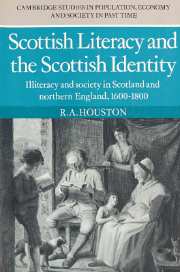 Scottish Literacy and the Scottish Identity
Scottish Literacy and the Scottish Identity Book contents
- Frontmatter
- Contents
- Tables
- Abbreviations
- Preface
- 1 The ideal of Scottish literacy
- 2 Structures and trends in illiteracy in the seventeenth and eighteenth centuries
- 3 Illiteracy in mid seventeenth-century Britain
- 4 The reasons for literacy
- 5 Measures of literacy
- 6 Oral culture and literate culture
- 7 The politics of literacy
- 8 Literacy and the Scottish identity
- Appendices
- Bibligraphy
- Index
1 - The ideal of Scottish literacy
Published online by Cambridge University Press: 11 November 2009
- Frontmatter
- Contents
- Tables
- Abbreviations
- Preface
- 1 The ideal of Scottish literacy
- 2 Structures and trends in illiteracy in the seventeenth and eighteenth centuries
- 3 Illiteracy in mid seventeenth-century Britain
- 4 The reasons for literacy
- 5 Measures of literacy
- 6 Oral culture and literate culture
- 7 The politics of literacy
- 8 Literacy and the Scottish identity
- Appendices
- Bibligraphy
- Index
Summary
Two decades ago the study of education and literacy suffered from a set of assumptions about social history as a whole. The story of kings and queens, parliaments and churches, diplomacy and warfare were seen as the only important subjects for scholarly work. The lives of the mass of the population in the past were largely obscure. They were a topic to be treated anecdotally as a necessary but fundamentally unimportant backdrop to more academically respectable subjects. Except for the great R. H. Tawney, the Hammonds and some first–rate work by women historians such as Alice Clark and Mildred Campbell, social history was dominated by Trevelyan and by a style of analysis which concentrated on the upper classes, atypical individuals or curiosities. Of the characteristic patterns of everyday life little had been revealed.
One of the most significant historical developments of the 1960s and 1970s has been the breakthrough in our understanding of the lives of ordinary people in the past. We now know much more about the texture of their experiences. We have glimpses of relations between husbands and wives, parents and children; we understand the complexity of kinship relations and the way economic and demographic forces interacted; conflict and co-operation, power and authority in village communities have provided a fascinating focus for research. The mental world and cultural horizons of men and women dead for centuries are no longer a complete mystery.
- Type
- Chapter
- Information
- Scottish Literacy and the Scottish IdentityIlliteracy and Society in Scotland and Northern England, 1600–1800, pp. 1 - 19Publisher: Cambridge University PressPrint publication year: 1985
- 1
- Cited by
